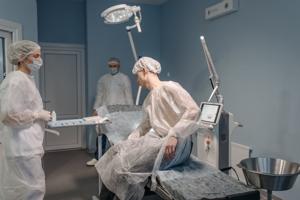Introduction
In recent years, the landscape of medical negligence litigation has evolved dramatically. With advancements in technology, shifts in healthcare policies, and changes in patient expectations, legal professionals must adapt to these new realities. Moseley Collins Law stands at the forefront of this evolution, bringing years of experience and insight into the complexities of medical negligence cases. In this article, we will delve deep into various facets surrounding the future of medical negligence litigation through the lens of Moseley Collins Law.
Moseley Collins Law's Take on the Future of Medical Negligence Litigation
Moseley Collins Law believes that the future of medical negligence litigation will be shaped by several key factors: technological advancements, evolving legal standards, increased patient awareness, and a changing healthcare environment. Each of these elements plays a crucial role in how legal professionals approach cases and advocate for their clients.
The Role of Technology in Medical Negligence Litigation
1. Telemedicine and Its Implications
Telemedicine has surged in popularity due to its convenience and accessibility. However, it also introduces new challenges for medical negligence claims. How can practitioners ensure a standard level of care when consultations occur via video calls? The answer lies in adapting existing legal frameworks to encompass telehealth scenarios.
2. Electronic Health Records (EHRs)
EHRs have transformed patient data management but can also be a double-edged sword. While they facilitate better communication among healthcare providers, they can also lead to critical information being lost or misinterpreted. Moseley Collins Law emphasizes that clear protocols must be established to protect patients’ rights and ensure accountability.
Evolving Legal Standards: What’s Next?
3. Changes in Statutory Regulations
As society progresses, so too does legislation surrounding medical negligence. What changes can we expect? New laws may address issues like consent forms for telehealth visits or expanding definitions of standard care within various specialties.
4. Increased Scrutiny on Healthcare Providers
There is an increasing trend toward holding healthcare providers accountable for their actions. This shift places heightened scrutiny on providers and raises questions about how juries will interpret provider behavior moving forward.
Patient Awareness: A Game Changer?
5. Informed Consent and Patient Rights
With more resources at their disposal, patients are becoming increasingly informed about their rights concerning medical treatment. How does this affect litigation? It leads to higher expectations from patients regarding transparency and accountability from healthcare providers.


6. Social Media’s Influence on Patients’ Perspectives
Social media platforms have become powerful tools for sharing experiences related to medical care. This phenomenon can amplify claims against hospitals or practitioners but may also foster community support for those who feel wronged.
Changing Healthcare Environment: New Challenges Ahead
7. The Impact of COVID-19 on Medical Negligence Cases
The COVID-19 pandemic has shifted priorities within the healthcare system significantly. What implications does this have for future litigation? As resources became strained during peak times, cases could arise around inadequate responses or failures to deliver timely care.
8. The Rise of Alternative Dispute Resolution (ADR)
As traditional court systems become overwhelmed with cases, ADR methods like mediation may grow more popular as viable options for resolving disputes without lengthy trials.
Strategies for Legal Professionals Moving Forward
9. Embracing Continuing Education
For legal professionals navigating these changes effectively, ongoing education is essential. Staying abreast of emerging trends ensures that lawyers are equipped with the latest knowledge necessary for effective representation.
10. Building Stronger Relationships with Medical Experts
Expert testimony remains critical in medical negligence cases; thus, cultivating relationships with credible experts is paramount to bolster a case's validity.
The Importance of Client-Centered Advocacy
11. Understanding Clients' Needs and Concerns
Advocating for clients means understanding their unique situations thoroughly—this goes beyond just legal jargon; it involves empathizing with their experiences and establishing trust throughout the process.
12. Navigating Emotional Turmoil Post-Incident
Patients often face significant emotional trauma after experiencing medical negligence; therefore, providing comprehensive support during litigation becomes vital not only legally but also emotionally.
Future Trends in Medical Negligence Litigation
13. Predictive Analytics: A New Frontier?
The use of predictive analytics could revolutionize how law firms assess risks associated with different types of cases—by identifying patterns in previous outcomes related to similar incidents.
14. AI Integration into Legal Research
Artificial intelligence has begun transforming research processes within law firms—saving time while improving accuracy when analyzing past verdicts or settlements relevant to current cases at hand.
FAQs About Moseley Collins Law's Insights on Medical Negligence Litigation
1. What constitutes medical negligence under Moseley Collins Law’s perspective?
Medical negligence occurs when a healthcare provider fails to meet accepted standards resulting in harm or injury to a patient due to carelessness or improper treatment methods.
2. How can technology improve outcomes in such litigations?
Technology enhances communication among parties involved while streamlining documentation processes—ultimately leading towards clearer evidence presentation during trials or negotiations.
3. What role does patient education play in preventing malpractice claims?
Educated patients are more likely aware of potential risks associated with treatments which fosters open dialogue between them and their providers—reducing misunderstandings that could escalate into legal disputes later down-the-line!
4. Are there specific challenges posed by telemedicine related malpractice claims?
Yes! The lack-of-physical examination presents hurdles regarding establishing whether appropriate measures were taken by practitioners during remote consultations compared-to-in-person ones leading potentially ambiguous interpretations surrounding liability issues thereafter!
5. How important is expert testimony in proving negligence cases?
Expert testimony serves as an invaluable asset—enabling attorneys present persuasive arguments based-on-industry-standard https://standardofcareviolationsfactscompilation.wordpress.com/2025/02/04/understanding-your-rights-as-a-patient-after-an-injury/ practices elucidated through professionals who share credibility within respective specialties pertinent-to-the-case-at-hand!
6. Will alternative dispute resolution methods gain traction moving forward?
Absolutely! Given courts’ congestion levels amidst rising caseloads coupled-with growing acceptance from both sides seeking amicable resolutions outside courtroom settings—it stands poised-for-affordability-and-time-efficiency benefits alike!

Conclusion
The future landscape surrounding medical negligence litigation is undoubtedly complex yet filled with opportunities for improvement through proactive strategies embraced by firms such as Moseley Collins Law! By adapting practices based-on technological advancements alongside evolving patient expectations—we’ll see better outcomes benefiting clients navigating these turbulent waters ahead! Emphasizing empathy while prioritizing client needs remains paramount-focused advocacy providing avenues ultimately ensuring justice prevails consistently throughout every single case encountered along-the-way!